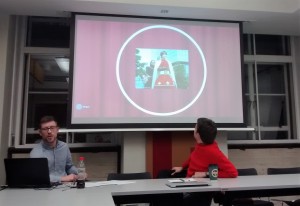Date & Place: Monday 28 February, in the Wolfson Room NB02, IHR Basement, North block, Senate House
Speakers: Harry Stopes (UCL)
Paper Title: ‘Lydéric, sauveur de Flandres’: The Politics of the Regional Opera in Lille, 1881-1896
Chair: Iain Stewart (UCL)
In Britain today the Royal Opera House lambasts our philistine politicians for being ‘scared to show their faces’ at opening nights, while our broadsheet columnists look on with envy and tangible cultural cringe at Angela Merkel gliding into Bayreuth for a few seriously enriching hours of Wagner. Although the members of our expensively educated cabinet are no strangers to black tie, they are far more likely to strap on the cummerbunds for Mansion House than the opera house. By contrast, in the provincial cities of late-nineteenth-century France that, alongside Manchester, Harry Stopes has made into his historical stomping (and drinking) ground, political patronage of the opera was serious business. The councillors and critics of Lille could, like our own journalists, be found casting a jealous glance over the Rhine, but it is fair to say that closing the perceived cultural gulf between themselves and the mighty Germans was more of a concern for Géry Legrand, mayor of the northern industrial city between 1881 and 1896, than it will ever be for Sajid Javid. The results of Legrand’s efforts to energise the Lille opera, Stopes argued, can not only help us to steer our gaze away from Paris and provincialise the history of nineteenth-century France, but also reveal the surprising flexibility of concepts such as regionalism and Wagnerism in the hands of the Third Republic’s provincial elites.
Stopes’ story started with the challenges of liberalisation. Until Napoleon III’s deregulation of the theatre in 1864, theatrical performance in France was governed by a complex system of subsidies and licensing. Cahiers des charges specified both the genres to be performed and the prices of seats. Although the system was draconian, it did ensure a certain level of state support for the opera. The removal of this system coincided with the apparent decline of Paris as a centre of European grand opéra in the face of the rising Wagnerian tide from over the Rhine – Wagner left Paris for Biebrich in 1862 – precipitating a crisis of confidence in municipal opera. How would regional cities like Lille sustain an opera-going public when even mighty Paris was struggling? And how could France produce its own Wagner to revive the art form in a new national form?
The mayor Legrand who confronted this problem was an archetypal Opportunist Republican. The son of a local lawyer, he had himself studied law before pursuing a career as a writer and publicist, most notably with the region’s leading left-wing newspaper, the Progrès du Nord. A partisan of decentralisation and passionate advocate of the theatre, Legrand successfully defended municipal subsidies for the stage. These rose from 60,000 francs in 1881 to 96,000 by his departure in 1896. As Stopes highlighted, the Lille elite did not look slavishly to Paris but rather cast nervous glances at competing provincial centres like Rouen – which was producing important premiers by Wagner and Saint-Saëns – or Brussels – which hosted Vincent d’Indy’s Fervaal.
For many historians, the premier of Fervaal in 1897 has signalled the arrival of a successful tradition of Wagnerian opera in France (albeit literally in Belgium). Stopes wishes to complicate this picture with a lillois example: Émile Pierre Ratez’s Lydéric, which premiered two years earlier in 1895. Lydéric was founded in Lille’s local popular culture. Its plot followed a Flanders legend about a giant who lived in a forest, and Lille parades involved giant figurines marching through the streets of the city. (The French media’s commentary on a recent revival fantasised about a giant Martine Aubry, as pictured the photo accompanying this blogpost.)
What was the political significance of Lydéric? Drawing on popular traditions and evoking chansons populaires in the music was, Stopes suggested, a political gesture for the republican socialist Ratez, who had been closely involved in both the Progrès du Nord and the Université Populaire workers’ education movement. The heroes of Lydéric were, just like the local industrial workers, raised on goat’s milk.
Beyond the politics of the opera itself, Stopes believes there is a grander political significance to Lydéric. Historians tend to see the performance of Fervaal in Brussels as a Wagnerian invocation of the nation’s common and ‘authentic’ Celtic roots which had a special importance to French nationalism. Here, the Celtic region stood in a synecdochic relationship to the French nation, providing a political message of national revival. By contrast, Stopes argued, Lydéric used the region – in this case Flanders – in order to establish the region itself as the central locus of politics. Unlike d’Indy, we might say, Ratez evoked the region for its own sake. Wagnerism could, then, be turned not simply to nationalist and conservative but also to regionalist and socialist ends. Regionalism, meanwhile, could be turned through opera to both nationalist and decentralist ends.
Beyond these specific arguments about the politics of nineteenth-century opera, Stopes was also making an important point about where historians choose to focus their investigations and register significance. The example of Lille’s municipal opera shows that the French adoption of Wagnerism occurred not simply through celebrated or nationally recognised figures such as d’Indy, or in national capitals such as Paris or Brussels, but through a more variegated and regionally disseminated process.
It was only a shame that we were not able to signify our appreciation for Stopes’ argument here by pelting him with cabbages and oranges, as was apparently the tradition among Lille spectators on preview nights. This time we had to settle for hearty applause, but future speakers might be advised to stay on their guard, at least until the Q&A is over…
Rob Priest


